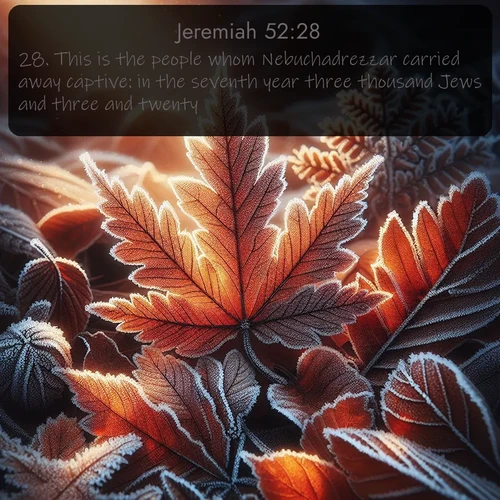Jeremiah 52:28 plusieurs versions / traductions
English Bible Translations
28. This is the people whom Nebuchadrezzar carried away captive: in the seventh year three thousand Jews and three and twenty:
28. This is the people whom Nebuchadrezzar carried away captive: in the seventh year three thousand Jews and three and twenty;
28. These are the people whom Nebuchadrezzar took away prisoner: in the seventh year, three thousand and twenty-three Jews:
28. This is the people whom Nebuchadrezzar carried away captive: in the seventh year three thousand and twenty-three Jews;
28. This is the people whom Nebuchadrezzar carried away captive: in the seventh year three thousand Jews and three and twenty:
28. This [is] the people whom Nebuchadrezzar hath removed: in the seventh year, of Jews, three thousand and twenty and three;
German Bible Translations
28. Dies ist das Volk, welches Nebukadnezar weggeführt hat: im siebenten Jahr dreitausend und dreiundzwanzig Juden;
28. Dies ist das Volk, welches Nebukadnezar gefangen weggeführt hat: Im siebenten Jahre 3023 Juden;
French Bible Translations
28. Voici la population que Nebucadnetsar emmena en exil: la septième année de son règne, 3023 Juifs;
28. Voici le peuple que Nebucadnetsar emmena en captivité: la septième année, trois mille vingt-trois Juifs;
28. Voici le peuple que Nebucadnetsar emmena en captivité: la septième année, trois mille vingt-trois Juifs;
28. C'est ici le peuple que Nebucadnetsar transporta: la septième année, trois mille vingt-trois Juifs;
28. Et c'est ici le peuple que Nébucadnetsar transporta; la septième année, trois mille vingt-trois Juifs.
28. C'est ici le peuple que Nébucadnetsar emmena en captivité: La septième année, trois mille vingt-trois Juifs.
Versions with Strong Codes
Jeremiah 52 / KJV_Strong28. This[H2088] is the people[H5971] whom[H834] Nebuchadnezzar[H5019] carried away captive:[H1540] in the seventh[H7651] year[H8141] three[H7969] thousand[H505] Jews[H3064] and three[H7969] and twenty: [H6242]
Strong Code definitions
H2088 zeh zeh a primitive word; the masculine demonstrative pronoun, this or that:--he, X hence, X here, it(-self), X now, X of him, the one...the other, X than the other, (X out of) the (self) same, such (a one) that, these, this (hath, man), on this side...on that side, X thus, very, which. Compare 2063, 2090, 2097, 2098.see H2063 see H2090 see H2097 see H2098
H5971 `am am from H6004; a people (as a congregated unit); specifically, a tribe (as those of Israel); hence (collectively) troops or attendants; figuratively, a flock:--folk, men, nation, people.see H6004
H834 'aher ash-er' a primitive relative pronoun (of every gender and number); who, which, what, that; also (as an adverb and a conjunction) when, where, how, because, in order that, etc.:--X after, X alike, as (soon as), because, X every, for, + forasmuch, + from whence, + how(-soever), X if, (so) that ((thing) which, wherein), X though, + until, + whatsoever, when, where(+ -as, -in, -of, -on, -soever, -with), which, whilst, + whither(- soever), who(-m, -soever, -se). As it isindeclinable, it is often accompanied by the personal pronoun expletively, used to show the connection.
H5019 Nbuwkadne'tstsar neb-oo-kad-nets-tsar' or Nbukadneotstsar (2 Kings 24:1, 10){neb-oo-kad-nets-tsar'}; or Nbuwkadnetstsar (Esther 2:6; Daniel 1:18) {neb-oo-kad-nets-tsar'}; or Nbuwkadreotstsar{neb-oo-kad-rets-tsar'}; or Nbuwkadreltstsowr (Ezra 2:1; Jeremiah 49:28) {neb-oo-kad-rets-tsore'}; or foreign derivation; Nebukadnetstsar (or -retstsar, or -retstsor), king of Babylon:--Nebuchadnezzar, Nebuchadrezzar.see H10
H1540 galah gaw-law' a primitive root; to denude (especially in a disgraceful sense); by implication, to exile (captives being usually stripped); figuratively, to reveal:--+ advertise, appear, bewray, bring, (carry, lead, go) captive (into captivity), depart, disclose, discover, exile, be gone, open, X plainly, publish, remove, reveal, X shamelessly, shew, X surely, tell, uncover.
H7651 sheba` sheh'-bah or (masculine) shibrah {shib-aw'}; from H7650; a primitive cardinal number; seven (as the sacred full one); also (adverbially) seven times; by implication, a week; by extension, an indefinite number:--(+ by) seven(-fold),-s,(-teen, -teenth), -th, times). Compare 7658. see H7650see H7658
H8141 shaneh shaw-neh' (in plura or (feminine) shanah {shaw-naw'}; from H8138; a year (as a revolution of time):--+ whole age, X long, + old,year(X -ly). see H8138
H7969 shalowsh shaw-loshe' or shalosh {shaw-loshe'}; masculine shlowshah {shel-o-shaw'}; or shloshah {shel-o-shaw'}; a primitive number; three; occasionally (ordinal) third, or (multipl.) thrice:--+ fork,+ often(-times), third, thir(-teen, -teenth), three, + thrice. Compare 7991.see H7991
H505 'eleph eh'-lef prop, the same as H504; hence (the ox's head being the first letter of the alphabet, and this eventually used as a numeral) a thousand:--thousand.see H504
H3064 Yhuwdiy yeh-hoo-dee' patronymically from H3063; a Jehudite (i.e. Judaite or Jew), or descendant of Jehudah (i.e. Judah):--Jew.see H3063
H7969 shalowsh shaw-loshe' or shalosh {shaw-loshe'}; masculine shlowshah {shel-o-shaw'}; or shloshah {shel-o-shaw'}; a primitive number; three; occasionally (ordinal) third, or (multipl.) thrice:--+ fork,+ often(-times), third, thir(-teen, -teenth), three, + thrice. Compare 7991.see H7991
H6242 `esriym es-reem' from H6235; twenty; also (ordinal) twentieth:--(six-)score, twenty(-ieth).see H6235
Prédications qui analysent les thèmes Jérémie 52
Thèmes : La chute de Jérusalem; Le jugement sur les roisRelated Sermons discussing Jeremiah 52
Themes : La chute de Jérusalem; Le jugement sur les roissee also: Bible Key Verses ; KJV Bible Images, BBE Bible images

